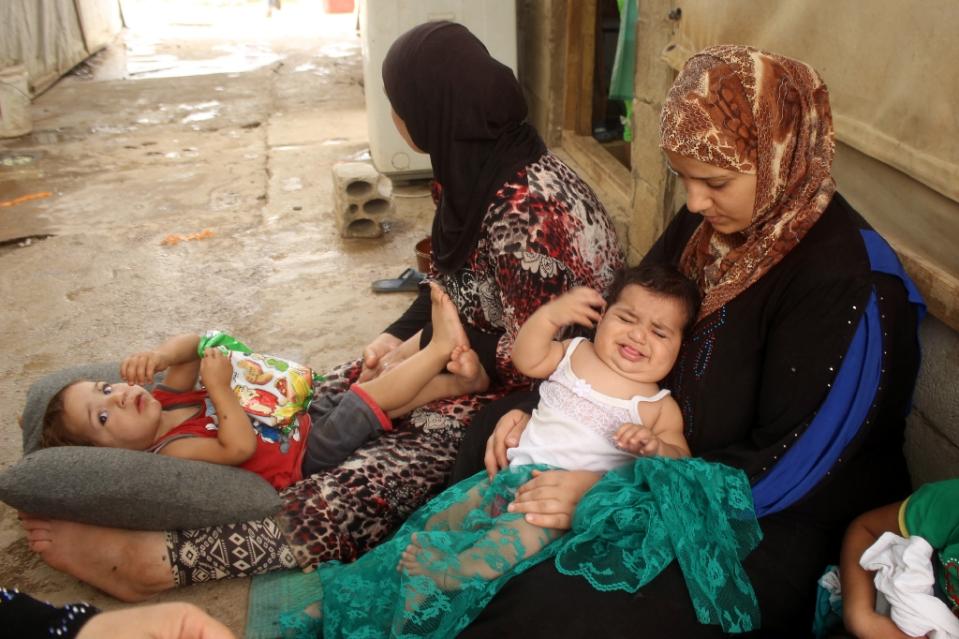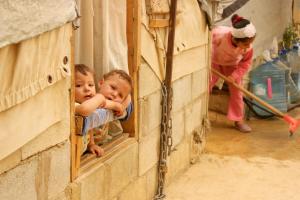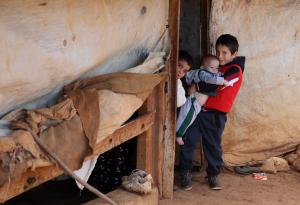By Sara Hussein AFP

Taybeh (Lebanon) (AFP) – In a tent in Lebanon’s Bekaa Valley, Sanaa al-Absi extracts a condom from its wrapper in front of a group of giggling Syrian refugee women and begins explaining its use.
It is the first time some of the women have seen the contraceptive, which they are learning about as part of a rare programme teaching Syrian refugees family planning in Lebanon.
The subject is a sensitive one, strewn with cultural, religious and even political landmines.
In much of the Middle East, large families are seen as a blessing from God, and contraception is regarded with scepticism or outright hostility.
And in Lebanon, where an influx of 1.1 million Syrian refugees has strained resources and tempers, family planning can be misconstrued as a way to stem the growth of the displaced population.
Absi, herself a 30-year-old Syrian refugee from southern Daraa province, is careful but confident as she talks the women through different contraceptives in a tent used as a classroom.
She is a volunteer with Doctors Without Borders (MSF), which provides the women with free contraceptives as well as pre- and post-natal care.
In the tent in the makeshift camp by Taybeh village in eastern Lebanon, the women listen with varying degrees of engagement and embarrassment.
"Why are you laughing? It’s just like a balloon, right?" Absi jokes with them as she explains how to use a condom.
"Many men refuse to use it because they say it ruins the feel of sexual intercourse, but that is purely psychological," she insists.
Psychological perhaps, but every one of the 16 women attending say their husbands will not use condoms, and are more interested in other contraceptive methods.
– Clearing up misconceptions –
Absi shows them different varieties of the pill, as well as the contraceptive injection and the intrauterine device (IUD), aiming to clear up some misconceptions along the way.
"Some people come to me and say, the IUD trapped my husband’s penis! But that’s not possible," she says, explaining how the device works.
"Don’t worry," she adds, holding up an example of the device, sealed in plastic in its case.
"Not all of this goes inside of you, that would be a disaster!"
Given the sensitivities of the subject, Absi’s pitch for birth control is delicately calibrated, with references to religious, economic and health justifications for family planning.
"You can have 10 children if you want, but you should space them out," she says.
"Remember in the Koran they talk about breastfeeding a child for at least two years, which means spacing out your children," she adds.
"And we’re in a situation now where things are different and you have to think about the crisis and the circumstances."
– ‘My husband says it’s forbidden’ –
Those circumstances are precisely what attracts many of the women to the session.
Most have been in Lebanon for years now, some since the Syrian conflict began with anti-government protests in March 2011.
They scrape by with aid and occasional work, and their children have patchy access to education.
The camp they call home is searingly hot in the summer and covered with snow in the winter.
"In Syria, everything was easy, everything was cheap, but here we have to rely on aid, and it’s not coming anymore," says 35-year-old Shamsa, a mother of 11, whose smile reveals two gold teeth.
"People say that when a baby comes it’s a blessing and God will provide for it, but the reality is that it is hard to provide for them, so family planning is a must."
Shamsa opted for tubal ligation after her last child was born, nine months ago.
"If the situation was good, I would have continued having children, but under the circumstances, I decided to stop."
Her husband was opposed but eventually consented. He wanted more boys, since of her 11 children nine are girls.
MSF has been offering family planning sessions since April 2013 in four areas, mostly in around 15 makeshift campsites.
The sessions are also available for men, and some women say their husbands support spacing out children.
Fatima Al-Abdullah, an 18-year-old who married six months ago, is trying for her first child, but eventually plans to decide on a contraceptive method with her husband.
"We want four or five children, but he doesn’t want a child year after year," she says.
But other women’s husbands are less supportive.
"My husband says it is religiously forbidden, and that what God gives is good," says Huriyeh, a 27-year-old who is five months pregnant with her fifth child.
She has four girls, and had a boy who was disabled and died as a toddler.
"I’m hoping this pregnancy will be a boy, I think if it was a boy I would stop after that."
As she speaks, her husband wanders over and laughs, dragging on a cigarette.
"Don’t believe her, she wants at least a dozen children!" he says.





